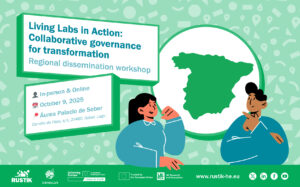On October 9, 2025, the RUSTIK project, in collaboration with the European initiatives Granular and Down to Earth, will organize its second regional workshop, taking place in Sober, Galicia (Spain) and online. The event will bring together researchers, practitioners, local and regional policymakers, and civil society representatives to explore collaborative approaches to rural sustainability and development.
Workshop focus: Living Labs and multi-actor governance
The workshop responds to interconnected challenges faced by Galicia and many rural regions across Europe, including depopulation, land abandonment and increasing wildfire risks. These issues require systemic solutions and stronger integration between science, community actors, and governance structures.
During the event, participants will engage in sessions exploring the role of Living Labs and the multi-actor approach as tools to support multilevel governance and evidence-based policymaking. Through structured, participatory exercises, the workshop aims to identify successful practices, existing gaps, and ways in which these methodologies can meaningfully contribute to regional development strategies.
Field visit: Model Village of Francos de Proendos (Sober, Lugo)
As part of the program, attendees will visit Francos de Proendos, designated a Model Village (Aldea Modelo) by the Galician Regional Government in 2022. The initiative, led by AGADER, seeks to revive abandoned rural land through sustainable uses, while simultaneously creating natural firebreaks to reduce wildfire risks.
Key facts about Francos de Proendos:
- Total area: 16.81 hectares (12.87 ha usable).
- 119 land plots owned by 70 different landholders, integrated into the Galician Land Bank.
- Land remains under private ownership, with owners receiving annual payments, while local producers lease it for sustainable activities.
A unique opportunity for rural transformation
The field visit will provide participants with firsthand insights into how community-based land management and collaborative governance can foster rural revitalization, aligning environmental, social, and economic objectives.
Registration and further information
REGISTRATION is still open and the AGENDA is now available for consultation.

